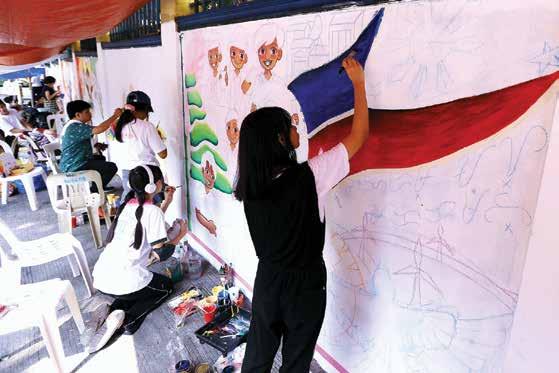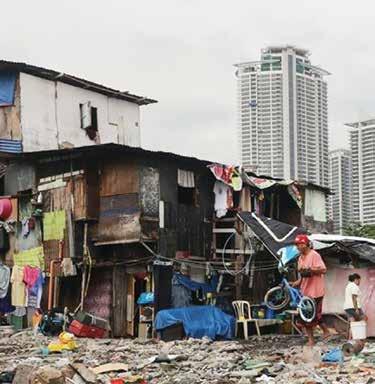
4 minute read
76% think Philippine headed in right direction – poll
by Janvic Mateo Philstar.com
MANILA — A large majority of Filipinos, although fewer than last year, think the country is headed in the right direction, the latest survey by OCTA Research group showed.
Advertisement
Results of the March 24 to 28 survey released yesterday found that 76 percent of the respondents believe that the Philippines is heading in the right direction.
However, the figure is down by nine points from the 85 percent obtained in a similar survey held in October last year.
Meanwhile, those who thought that the country is moving in the wrong direction increased from six percent last October, to 10 percent in the latest poll.
The remaining 13 percent said they do not know, up from nine percent.
OCTA said the decline from last quarter among those who thought that the country is
by Pia Lee-Brago Philstar.com
MANILA — Fifty-one percent of Filipino families consider themselves poor, according to a recent Social Weather Stations (SWS) survey.

The nationwide survey conducted among 1,200 adults from March 26 to 29 revealed that 51 percent of Filipino families rate themselves as “mahirap” or poor.
Thirty-one percent rated themselves as “borderline” by placing themselves in a horizontal line dividing poor and not poor, while 19 percent rated themselves as “hindi mahirap” or not poor.
“This is similar to (the survey conducted in) December 2022, when poor families were at 51 percent, borderline families at 31 percent and not poor families at 19 percent,” SWS said.
It noted that the estimated number of self-rated poor families was at 14 million last March, rising from the 12.9 million in December last year.
“Self-rated poor rose in Metro Manila from 32 percent to 40 percent, and from 58 percent to 65 percent in the Visayas. However, it fell in Balance Luzon from 49 percent to 43 percent while it was statistically steady in Mindanao, moving from 59 percent to 62 percent,” the polling agency said.
Borderline respondents did not statistically change in Metro Manila from 29 percent to 26 percent, in balance Luzon from 30 percent to 32 percent and in Mindanao from 30 percent to 33 percent, but fell in the Visayas from 34 percent to 26 percent.
Filipinos who considered themselves not poor rose in
It was lowest among those in Metro Manila at 59 percent (from 70 percent), followed by those in Mindanao at 75 percent (from 84 percent), rest of Luzon at 77 percent (from 87 percent) and the Visayas at 87 percent (from 91 percent).
It was 65 percent among those belonging to classes ABC (from 79 percent), 63 percent among class E (from 81 percent) and 78 percent among class D (from 86 percent).
Meanwhile, those who thought that the country is headed in the wrong direction was highest among respondents in Metro Manila at 19 percent (from 10 percent), followed by those in Mindanao at 15 percent (from eight percent), the Visayas at nine percent (from six percent) and rest of Luzon at five percent (no change).
SWS: 51% of families feel poor
balance Luzon from 20 percent to 25 percent, but fell in Metro Manila from 39 percent to 33 percent and in Mindanao from 11 percent to six percent. It did not change in the Visayas at nine percent.
The minimum monthly budget that self-rated poor families said they need for home expenses to not consider themselves poor has remained sluggish for several years despite considerable inflation.
“This indicates that poor families have been lowering their living standards, i.e., belttightening,” SWS said.
The average poor families lack about half of what they need to not consider themselves poor.
Of the families who rated themselves poor, 6.5 percent are considered “newly poor” as they were not poor one to four years ago.
Another 6.7 percent were nonpoor five or more years ago, and 37.9 percent were considered “always poor.”
Of the estimated 14 million self-rated families in the March survey, 1.8 million were newly poor, 1.8 million were usually poor and 10.4 million were always poor, according to SWS.
The same survey also found that based on the type of food they eat, 39 percent of Filipino families rated themselves as “food-poor,” 35 percent rated themselves as “borderline foodpoor” and 26 percent rated themselves as “not food-poor.”
Compared to December 2022, the percentage of food-poor families rose from 34 percent, while borderline food-poor families hardly moved from 38 percent and not food-poor families barely changed from 28 percent. g
Across socio-economic classes, those who thought that the country is headed in the wrong direction significantly increased among class E at 17 percent (from three percent), followed by classes ABC at 11 percent (no change) and D at eight percent (from six percent). OCTA’s independent Tugon ng Masa survey had 1,200 adult respondents and a margin of error of +/- three percent for national percentages. g
The Holy Father urged them to make “good use of the time” of service at the Vatican to deepen and put into practice their Catholic faith.
“Every situation, every meeting can represent an opportunity to put the Gospel of Christ into practice, to learn from him and to live fraternal love in his name and with his Spirit,” the pope said.
“Your mission here in the Vatican is a path that the Lord has opened for you to live your Baptism and bear joyful witness to your faith in Christ,” the Holy
Father added.
Born in 1998, Eviota moved to Switzerland in 2009 together with her elder sister on a family reunion visa. He joined the Youth for Christ, the youth ministry of the Couples for Christ (CFC). His father Diomedes is from Surigao City while his mother Editha, who passed away in 2000, was from Esperanza town, Agusan del Sur province.

He was a second lieutenant at the Swiss Army before he was admitted to the Swiss Guards in January 2022 to complete his basic training. photo headed in the right direction was due to decreases that were consistent across all major areas and socioeconomic classes.
Eviota is the second Filipino to be included in the Swiss Guards after Swiss-Filipino Vincent Lüthi, whose mother is from Cebu.
Founded by Pope Julius II in 1506, the Swiss Guards is a military body made up of Swiss citizens, whose main task is to protect the pope and his residence.
Among their duties are also to accompany the pope on apostolic journeys and to protect the College of Cardinals during the vacant see. (PNA)






